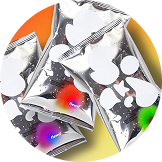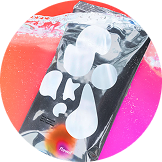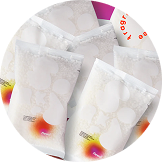Whether you’re looking into the benefits of magnesium for sleep, stress, recovery, or focus, there are so many different ways you can tap into its therapeutic potential. From oral to transdermal methods and varying forms of magnesium, it’s important to choose wisely.
A common comparison we see online is magnesium aspartate vs glycinate, and we’re here to help you figure out which best suits your needs - if either.
Magnesium aspartate supports energy metabolism and athletic performance, often used to combat fatigue. Magnesium glycinate sits on the other end of the spectrum - it’s a relaxing form used to manage anxiety, sleep troubles, and stress as a whole.
We’ll compare and contrast magnesium glycinate vs aspartate below to help you get a better sense of where each has an edge and which can fit in your self-care regimen.
But the simple fact of the matter is neither form can match the absorption and whole-body support that magnesium chloride has to offer.
Our magnesium bath soak products at Flewd Stresscare use it as the foundation, but we bring complementary vitamins, minerals, and nootropics to round out our formulations to aid in specific wellness outcomes - be it better sleep, faster recovery, mood support, or anything else.
Don’t sell the benefits of magnesium short. Get the form your body can actually use today!
| Magnesium Aspartate | Magnesium Glycinate | Magnesium Chloride in Flewd Bath Soaks | |
|---|---|---|---|
| Primary Benefit | Supports ATP energy production and muscle performance | Calms the nervous system and promotes relaxation | Broad support: muscle recovery, hormone balance, nervous system, sleep |
| Best Use Case | Athletic performance, fatigue from exertion | Anxiety, tension, difficulty sleeping | Chronic stress, burnout, inflammation, hormone issues, aches and pains, insomnia |
| Absorption Route | Oral only | Oral only | Transdermal or oral |
| Absorption Efficiency | Moderate | Moderate | High – bypasses digestion entirely |
| Common Side Effects | GI upset | Digestive discomfort | None when used topically (light tingling) |
Overview of Magnesium Aspartate
Magnesium aspartate is a chelated form of magnesium. That just means the mineral is bound to something else, in this case, aspartic acid.
This amino acid supports cellular energy production, which is why you’ll see magnesium aspartate in supplements designed to boost physical and mental performance. Here are some of its potential benefits and common uses:
- May help reduce feelings of physical fatigue
- Supports ATP production and cellular energy
- Sometimes used in sports recovery formulas
- May help with mild magnesium deficiency symptoms
- May support muscle performance in active individuals
Magnesium apartate is all about performance. It’s generally absorbed well, but any form of oral magnesium (pills or powders) could cause digestive upset. It can also have a somewhat stimulatory effect, worsening anxiety or causing jitteriness in some individuals.
In this sense, it’s not the right form if you’re looking for something to help you unwind at night and get better rest. It has the opposite intended effect, ramping you up rather than calming you down. Save it for daytime use.
Which magnesium is best for sleep, then? Magnesium chloride is our personal favorite, and we’ll explain why later on. In the meantime, we’ll introduce the other half of our magnesium aspartate vs glycinate comparison.
Overview of Magnesium Glycinate
Magnesium glycinate is also a chelated form, which is why it’s not surprising we see comparisons drawn between magnesium glycinate vs aspartate all the time.
This form is bound to glycine, a non-essential amino acid that plays a role in calming the nervous system and supporting sleep. It’s a good choice for people dealing with stress, poor sleep, or occasional anxiety. Here are some common applications:
- May promote relaxation and help with occasional anxiety
- Often used as a natural sleep aid
- Can help ease muscle tension or soreness
- May be easier on the stomach than other forms
- Commonly used in long-term stress support routines
But despite its reputation as “gentle,” magnesium glycinate doesn’t work the same for everyone. Anytime you take magnesium orally, you can generally expect some sort of digestive upset, be it bloating or loose stools. It's not calming enough to move the needle on sleep troubles, either.
Still, it’s one of the most common forms of magnesium on the market - which is why we’ve written other comparisons like magnesium carbonate vs citrate and magnesium chloride vs glycinate. On that note, let’s take a closer look at magnesium aspartate vs glycinate below.
Magnesium Aspartate vs Glycinate: Key Differences to Consider
Magnesium supports over 300 bodily processes, and it’s not available in many natural dietary sources. This is to say you NEED to give your body magnesium in some way or another. But the specific form you feed it can shape your comfort and results. Don’t take it lightly.
In saying that, what’s the better choice between magnesium glycinate vs aspartate? It all comes down to your specific goals. And as you’ll discover in a moment, the answer could be neither - because BOTH have their shortcomings. Here’s what you need to know…
Support for Energy vs Calm
These two forms sit on totally different ends of the energy spectrum. One is uplifting, the other calming - so choosing between magnesium aspartate vs glycinate can actually be pretty simple.
Magnesium aspartate tends to support energy production and physical stamina. It’s a key component in supplements marketed for workout recovery or daily fatigue. It’s far more stimulating than relaxing, so it can be helpful in the morning but problematic in the evening.
On the other hand, magnesium glycinate brings calming support to your regimen. It’s considered the best magnesium for stress in some cases, though we still believe magnesium chloride has an edge based on bioavailability.
At any rate, glycinate can also help with overall restlessness and anxious, racing thoughts. It’s not a sedative, but its connection to the amino acid glycine gives it a gentler, more wind-down feel for nighttime use.
Which Is Better for Sleep and Recovery?
Building on that last point, it’s clear that magnesium glycinate is the smarter choice for sleep support. Especially if racing thoughts or physical tension are what’s keeping you up at night. It won’t knock you out cold, but it creates the ideal foundation for healthy sleep.
Magnesium aspartate isn’t typically used for sleep - it would honestly have the opposite intended effect, leaving you feeling tired but wired. That said, it may help with physical recovery by improving energy metabolism so you can get back to your next workout faster.
In either case, the benefit stops at the digestive system. Neither form offers a complete solution if your goal is full-body recovery, both mental and muscular. Speaking of the digestive system…
Absorption Rates
Both magnesium glycinate and aspartate are considered bioavailable, meaning they’re absorbed reasonably well when taken orally. But absorption can still be impacted by gut health, competing minerals, and individual digestive efficiency.
Ultimately, we don’t recommend oral magnesium supplements because they’re all poorly absorbed and notorious for causing discomfort. This is because you have to compensate for relatively low bioavailability by taking a heftier dose, and this taxes your gut.
Take too much, and you’re likely to end up in the bathroom before seeing real benefit. That’s why we always recommend transdermal forms of magnesium, like our world-renowned epsom salt alternative at Flewd Stresscare.
Tolerance and Sensitivity Issues
We just touched on this a bit, but you shouldn’t only compare magnesium aspartate vs glycinate based on the potential benefits. The side effects matter just as much.
Magnesium glycinate is generally well tolerated, but it’s not always effective at higher stress levels. And while it’s easier on the stomach than some forms, that doesn’t mean it’s always absorbed well - as we said earlier.
But, magnesium aspartate can be problematic for a different reason: the aspartic acid itself. It’s useful in small amounts but tends to have an “exciting” effect on the nervous system, which can make matters worse for people prone to anxiety or overstimulation.
That’s not to mention the digestive issues linked to oral magnesium aspartate, either. These limitations for both magnesium aspartate and glycinate can be frustrating when you’re looking to feel a real, tangible difference. Don’t worry - a better option is well within reach.
The Case for Magnesium Chloride
Magnesium chloride is a highly absorbable form of magnesium, often used in topical or transdermal applications. This is what makes it so special.
While oral supplements have to pass through your digestive system (and often come with limits on how much you can absorb), magnesium chloride can be absorbed directly through the skin.
It’s great for people dealing with poor gut health, nutrient absorption issues, or simply looking for more efficient magnesium delivery without those frustrating, uncomfortable downsides of oral intake.
The benefits go beyond convenience, though. Transdermal magnesium chloride can support muscle recovery, ease nervous tension, reduce nighttime restlessness, and replenish depleted reserves without taxing the GI tract.
This is among the easiest ways to meet your body where it is through your largest organ (the skin), whether you’re managing fatigue, stress, soreness, or sleep issues. We make it even easier at Flewd Stresscare with precision-formulated blends that fit into your self-care ritual.
Bring the Benefits of Magnesium into Your Ritual With Flewd Stresscare!
We create functional, magnesium-rich bath soaks designed to help your body rest, recover, and regulate without pills or powders. From our muscle bath soak to our anxiety bath soak, it all starts with magnesium chloride and builds on it with vitamins, minerals, and essential oils.
Everything we sell is 99% natural, vegan, non-toxic, and biodegradable so you can feel good about spoiling yourself at Flewd Stresscare. There’s something tailored to your exact needs:
- Ache Erasing Soak: Vitamins C and D with omega-3s help ease inflammation and relax tense muscles. It’s scented with mandarin, clementine, and blood orange.
- Anxiety Destroying Soak: Features a full B-complex and zinc to support the nervous system during periods of overload. The scent brings to mind a tropical coastline.
- Insomnia Ending Soak: Blended with vitamins A and E and L-carnitine to support circadian balance and encourage deeper rest. It smells like crisp yuzu with a delicate floral finish.
- Sads Smashing Soak: Added vitamins B3 and B6, plus nootropic lithium, to support emotional balance and serotonin regulation. Its scent is green, minty, and woody.
- Rage Squashing Soak: Contains chromium and B12 to reduce cortisol spikes and help soften emotional reactivity. The scent is earthy and grounding.
- Panic Crushing Soak: Made with boron and omega-3s to support hormone balance and ease physical tension during moments of acute stress. It carries a soft, warm scent.
Plus, it’s so easy to use any stress relief bath soak from Flewd Stresscare. Draw a warm bath, empty the contents of your soak and swirl them around, and then indulge in unparalleled relaxation for 20-30 minutes. Do this a few times a week and you’ll be amazed at how you feel!
“I LOVE flewd. I feel a difference in my sleep with some of the packs, and overall it's just a nice relaxing experience, even over just epsoms alone. THANK YOU!” - Fallon
“These bath soaks have truly changed my life! When I was having trouble sleeping for the first time in my life and nothing else worked, these soaks saved the day! I can not live without them! My favorites are Sads Smashing and Insomnia Ending.” - Cheryl
“I absolutely love these soaks!!! Makes me very relaxed and comfortable after a hard stressful day!!” - Tina
Bringing Our Magnesium Glycinate vs Aspartate Comparison to a Close
Whether you’re comparing magnesium aspartate vs glycinate or magnesium glycinate vs threonate, you’re selling yourself short. Magnesium chloride is the only form that offers better absorption without discomfort, and targeted benefits for sleep, stress, and recovery.
So, don’t settle for anything less than the best. Elevate your self-care regimen at Flewd Stresscare today and discover firsthand the difference bioavailable magnesium chloride can make in your life! Choose the soak that fits your symptoms now.
























































